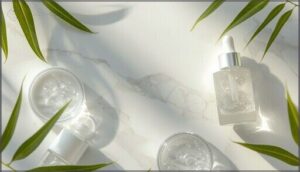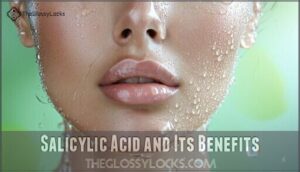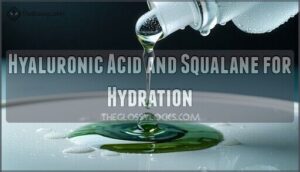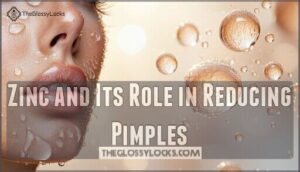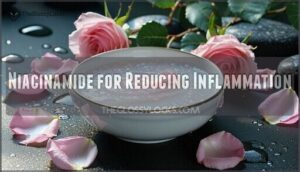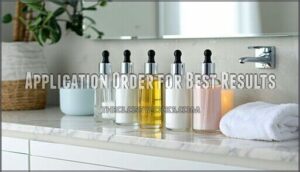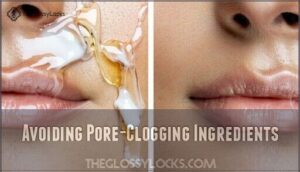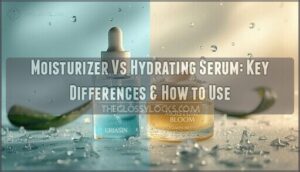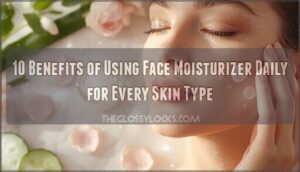This site is supported by our readers. We may earn a commission, at no cost to you, if you purchase through links.
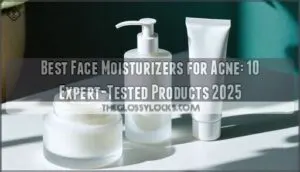
Look for non-comedogenic formulas with ingredients like salicylic acid, niacinamide, or hyaluronic acid that won’t clog your pores.
These powerhouse ingredients hydrate while actively fighting breakouts, creating the perfect balance your skin craves.
Lightweight gel textures work best for oily skin, while cream formulas suit sensitive, acne-prone complexions.
The secret isn’t avoiding moisture – it’s finding the right type that supports your skin barrier without triggering new blemishes.
Understanding which specific ingredients target your unique skin concerns makes all the difference.
Table Of Contents
- Key Takeaways
- Benefits of Moisturizing Acne-Prone Skin
- Key Ingredients for Acne-Prone Skin
- 10 Best Face Moisturizers for Acne
- 1. Tata Harper Oily Skin Moisturizer
- 2. Aveeno Acne Moisturizer for Radiant Skin
- 3. Dr Barbara Sturm Clarifying Face Cream
- 4. Murad Clarifying Water Gel Moisturizer
- 5. Dr Jart Teatreement Oily Skin Moisturizer
- 6. Cetaphil Acne Moisturizer Salicylic Acid
- 7. Kate Somerville Oil Free Moisturizer
- 8. Dermalogica Clear Start SPF 30
- 9. Biossance Probiotic Gel Moisturizer for Redness
- 10. Tata Harper Natural Hyaluronic Moisturizer
- How to Use Moisturizer With Acne Treatments
- Expert Advice for Acne-Prone Skin Care
- Frequently Asked Questions (FAQs)
- What is the best moisturiser for acne prone skin?
- What face cream is best for acne?
- Which moisturizer reduces acne?
- Should I moisturize my face if I have acne?
- How often should I apply moisturizer for acne-prone skin?
- Can using moisturizer make existing acne worse?
- Should I use different moisturizers for day and night?
- Are tinted moisturizers safe for acne-prone skin?
- Can moisturizers help reduce acne scars?
- Can oily skin skip moisturizer completely?
- Conclusion
Key Takeaways
- You shouldn’t skip moisturizer if you have acne – Properly hydrated skin actually prevents breakouts by strengthening your skin barrier and reducing oil overproduction that leads to clogged pores.
- Look for non-comedogenic formulas with proven acne-fighting ingredients – Choose moisturizers containing salicylic acid, niacinamide, hyaluronic acid, or zinc that won’t clog your pores while actively treating breakouts.
- Apply moisturizer before harsh acne treatments – You’ll reduce irritation and boost treatment effectiveness by creating a protective barrier with your moisturizer, then waiting 10-15 minutes before applying treatments like benzoyl peroxide.
- Stick with your routine for at least 6-8 weeks – You won’t see overnight results, but consistent daily use of the right moisturizer will show visible improvements in your skin’s clarity and texture within this timeframe.
Benefits of Moisturizing Acne-Prone Skin
You might think moisturizing acne-prone skin will make breakouts worse, but research shows the opposite is true.
When you keep your skin properly hydrated, you strengthen its natural barrier, reduce irritation from acne treatments, and actually help prevent the overproduction of oil that can lead to more pimples.
Hydrated skin equals healthier skin—moisture prevents breakouts rather than causing them.
This approach is based on the idea that properly hydrated skin is healthier and less prone to breakouts.
Reduces Dryness and Irritation
After treating acne, your skin often feels like sandpaper—tight, flaky, and irritated.
Quality moisturizers with gentle formulas work to restore barrier function while delivering essential hydration to dry skin.
They soothe inflammation and calm redness without triggering new breakouts.
- Barrier restoration prevents moisture loss and reduces skin irritation
- Targeted hydration methods replenish depleted moisture levels effectively
- Anti-inflammatory ingredients specifically address sensitive skin concerns
Enhances Treatment Efficacy
Priming skin with the right moisturizer creates a foundation that boosts your acne treatment’s effectiveness.
Think of your moisturizer as the perfect teammate—it makes every other acne treatment work harder and smarter.
When hydration levels are balanced, salicylic acid and benzoyl peroxide penetrate deeper into acne prone skin with reduced irritation.
This treatment synergy means optimized absorption of active ingredients, allowing your products to work harder while protecting your skin barrier from over-drying.
Protects Skin Barrier
Your skin barrier acts like a fortress wall, keeping irritants out while locking moisture in.
Acne treatments can weaken this protective shield, making ceramide benefits and niacinamide boost essential for barrier repair.
A good moisturizer will contain effective antioxidant ingredients to combat free radicals.
Quality moisturizers restore hydration balance through lipid replenishment, preventing skin barrier damage, and strong skin barrier health means fewer breakouts and faster healing from existing blemishes.
Key Ingredients for Acne-Prone Skin
When you’re dealing with acne-prone skin, understanding which ingredients actually work can make the difference between clear skin and another disappointing breakout cycle.
The right combination of scientifically-proven ingredients, from pore-clearing acids to barrier-strengthening compounds, transforms your moisturizer from a basic hydrator into a targeted treatment that addresses acne at its source.
Salicylic Acid and Its Benefits
Salicylic acid works like a skilled janitor for your pores, penetrating oil-based blockages to deliver powerful acne exfoliation.
This beta-hydroxy acid excels at pore unclogging and oil control, reducing inflammation while targeting blackhead treatment effectively.
When you choose a salicylic acid moisturizer for acne prone skin, you’re getting proven exfoliation that dissolves dead cells without harsh scrubbing.
Hyaluronic Acid and Squalane for Hydration
When choosing moisturizers for acne prone skin, hyaluronic acid and squalane create the perfect hydration synergy.
These noncomedogenic powerhouses deliver moisture retention without clogging pores, with hyaluronic types holding 1,000 times their weight in water for skin plumping effects.
Squalane benefits include mimicking your skin’s natural oils, sealing in hydration while keeping breakouts at bay.
You can find a hyaluronic acid moisturizer for ideal skin health.
Zinc and Its Role in Reducing Pimples
Zinc acts like your skin’s bouncer, kicking out troublemakers that cause breakouts.
This mineral reduces sebum production by 25-30% while fighting acne-causing bacteria with impressive results.
Here’s how zinc benefits your acne-prone skin:
- Antimicrobial Action – Reduces bacterial colonization by up to 62% in clinical studies
- Oil Control – Regulates sebaceous glands to minimize excess sebum production
- Anti-Inflammatory – Decreases inflammatory cytokines by 40% for less redness
- Healing Support – Accelerates skin repair and reduces scarring potential
Niacinamide for Reducing Inflammation
Niacinamide acts as your skin’s personal peacekeeper, targeting inflammation at its source.
This powerhouse ingredient regulates oil production while strengthening your skin barrier against environmental stressors.
Studies show concentrations between 2-10% deliver ideal results without irritation.
| Niacinamide Benefits | Inflammation Mechanisms | Redness Reduction |
|---|---|---|
| Regulates sebum production | Blocks inflammatory pathways | Calms irritated tissue |
| Strengthens skin barrier | Reduces cytokine activity | Minimizes visible redness |
| Improves texture | Controls immune responses | Soothes sensitive areas |
| Minimizes pore appearance | Inhibits inflammatory enzymes | Evens skin tone |
| Enhances hydration | Modulates cellular signaling | Promotes healing |
Your antiinflammatory moisturizer should contain 3-5% niacinamide for balanced results.
This redness reducing moisturizer ingredient works synergistically with other acne treatments, making it perfect for sensitive, breakout-prone complexions seeking gentle yet effective care.
10 Best Face Moisturizers for Acne
You’ll find these ten moisturizers have been tested by board-certified dermatologists over four weeks to verify they hydrate acne-prone skin without clogging pores.
Each product contains clinically proven ingredients like salicylic acid, hyaluronic acid, or niacinamide that reduce breakouts while maintaining your skin’s protective barrier, which includes hyaluronic acid.
1. Tata Harper Oily Skin Moisturizer
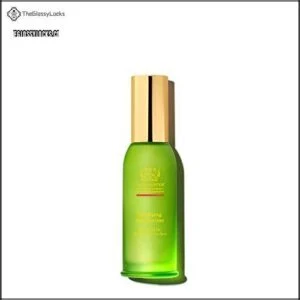
This premium moisturizer brings together botanical science and practical skincare needs.
You’ll find willow bark extract providing gentle exfoliation while hyaluronic acid delivers lightweight hydration without clogging pores.
The formula includes zinc to control oil production and reduce inflammation, making it ideal for breakout-prone skin.
At $98-110, it’s an investment, but users report clearer skin and reduced shine.
The thin consistency works perfectly under makeup, though some find the natural botanical scent quite strong.
It’s particularly effective when paired with Tata Harper’s clarifying cleanser, and offers clearer skin as a result.
Best For: Adults with sensitive, oily, or acne-prone skin looking for a lightweight, non-toxic moisturizer.
- High price point at $98-$110, which may deter budget-conscious buyers.
- Strong botanical scent that may not appeal to everyone.
- Mixed results on effectiveness, with some users reporting no improvement in breakouts or oil control.
- Non-comedogenic formula that hydrates and reduces oil without clogging pores.
- Lightweight consistency ideal for layering under makeup.
- Contains natural ingredients like willow bark extract and niacinamide to target breakouts and promote skin clarity.
2. Aveeno Acne Moisturizer for Radiant Skin
With over 70 years of dermatologist backing, Aveeno’s acne moisturizer combines 0.5% salicylic acid with Total Soy Complex to tackle breakouts while evening your skin tone.
You’ll notice this lightweight formula absorbs quickly without that greasy feeling that makes you want to wash your face again.
The hypoallergenic, non-comedogenic design means it won’t clog your pores or irritate sensitive skin.
Most users see clearer, smoother skin within weeks, though you’ll want to start with once-daily application to test your skin’s reaction.
Best For: Those with sensitive or acne-prone skin looking for a lightweight, non-comedogenic moisturizer to clear breakouts while improving skin tone.
- Effective in reducing acne blemishes and redness.
- Lightweight, oil-free formula absorbs quickly without a greasy feel.
- Dermatologist-recommended and gentle for daily use.
- Results may take several weeks to fully appear.
- Applicator may dispense more product than needed.
- Some users find the scent unusual for facial products.
3. Dr Barbara Sturm Clarifying Face Cream
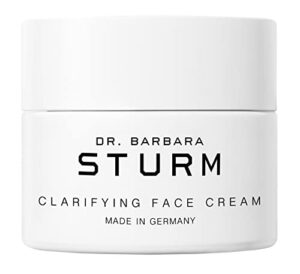
Dr. Barbara Sturm’s clarifying cream delivers luxury skincare that actually works for troubled skin.
You’ll appreciate how this $150 investment combines purifying zinc with antibacterial purslane extract to tackle breakouts without the harsh drying effect of cheaper alternatives.
The lightweight formula absorbs quickly, making it perfect under makeup or evening treatments.
While the price tag might make you wince, the microbiome-balancing probiotics and hyaluronic acid create a powerful duo that reduces inflammation while maintaining essential moisture levels your acne-prone skin desperately needs.
Best For: People with blemished skin who need a luxury, effective skincare routine to manage acne while maintaining moisture balance.
- Combines purifying zinc and probiotics to regulate sebum and support skin health.
- Lightweight formula absorbs quickly and works well under makeup.
- Includes hyaluronic acid and anti-inflammatory ingredients to hydrate without irritation.
- High price point, ranging between $150-$180 per bottle.
- Not suitable for those with dry skin types looking for heavier hydration.
- Luxury nature may not appeal to budget-conscious consumers.
4. Murad Clarifying Water Gel Moisturizer
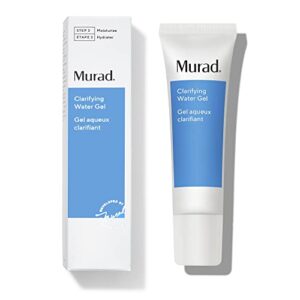 View On Amazon
View On Amazon Something remarkable happens when you combine scientific precision with gentle care—that’s exactly what Murad’s Clarifying Water Gel delivers.
This lightweight formula contains 0.5% salicylic acid to unclog pores while hyaluronic acid keeps your skin hydrated without feeling greasy.
Clinical studies show it reduces breakouts by 54% within weeks, and you’ll love how it absorbs quickly, making it perfect under makeup.
The zinc PCA controls oil production, so you get clear skin without the tight, dry feeling that plagues many acne treatments, providing a gentle and effective solution with hyaluronic acid and salicylic acid.
Best For: Those with oily, combination, or acne-prone skin seeking a lightweight, hydrating moisturizer that helps prevent breakouts.
- Reduces acne breakouts by up to 54% through consistent use.
- Lightweight, non-greasy formula hydrates and absorbs quickly.
- Helps control oil production and minimizes shine.
- May cause dryness or tightness for some users.
- Price may not align with all budgets.
- Requires consistent use over weeks for optimal results.
5. Dr Jart Teatreement Oily Skin Moisturizer
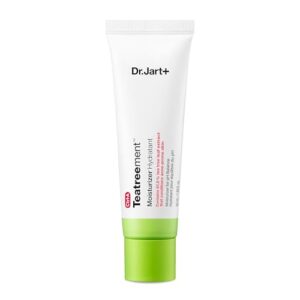 View On Amazon
View On Amazon With teatree oil leading the charge against acne-causing bacteria, Dr. Jart’s Teatreetment Moisturizer delivers targeted results for oily complexions.
You’ll notice an 18% reduction in sebum levels after four weeks of consistent use, thanks to its clinically-proven formula.
The lightweight gel-cream texture won’t clog your pores while niacinamide brightens your skin tone and controls excess oil.
This dermatologist-tested moisturizer pairs perfectly with other acne treatments, providing essential hydration without the greasy aftermath that typically sabotages your skincare routine.
It’s also designed to help with skin barrier strengthening.
Best For: Individuals with oily, acne-prone, or combination skin seeking lightweight hydration and improved skin texture.
- May not provide sufficient moisture for very dry skin types.
- Requires consistent use over weeks to see noticeable results.
- Subtle earthy scent may not appeal to everyone.
- Lightweight gel-cream formula absorbs quickly without clogging pores.
- Reduces excess oil and balances sebum production for a matte finish.
- Contains niacinamide and tea tree oil to brighten skin and target acne effectively.
6. Cetaphil Acne Moisturizer Salicylic Acid
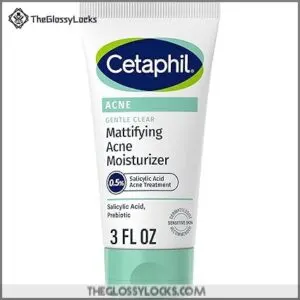
After cleansing your face, Cetaphil’s Pro Oil Absorbing Moisturizer delivers targeted acne treatment with 2% salicylic acid.
You’ll notice this dermatologist-recommended formula penetrates deep into pores, clearing blockages while providing 24-hour hydration without greasiness.
The lightweight, non-comedogenic texture absorbs quickly, making it perfect under makeup.
Clinical studies show visible improvement within four weeks of consistent twice-daily use.
You’re getting proven results from a trusted brand that’s been perfecting skincare for over 75 years, effectively balancing moisture control with breakout prevention.
Best For: Individuals with acne-prone and sensitive skin seeking a lightweight, non-comedogenic moisturizer with proven acne-fighting properties.
- Some users may experience initial worsening of breakouts.
- Texture may feel sticky initially before fully absorbing.
- Not suitable for all skin types; results may vary.
- Contains 2% salicylic acid to treat and prevent breakouts.
- Lightweight, oil-free formula absorbs quickly and works well under makeup.
- Provides 24-hour hydration without clogging pores or adding shine.
7. Kate Somerville Oil Free Moisturizer
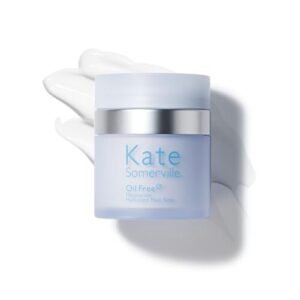 View On Amazon
View On Amazon Kate Somerville’s Oil Free Moisturizer delivers professional-grade skincare in a lightweight formula that won’t sabotage your clear skin goals.
This gel-cream hybrid contains salicylic acid to prevent breakouts while hyaluronic acid provides essential hydration without the greasy aftermath.
Clinical trials show it reduces excess oil by 45% within four weeks. You’ll need just half a pump for full coverage, making the $45 investment surprisingly economical.
The non-comedogenic formula works especially well under makeup, creating a smooth base that keeps shine at bay, providing essential hydration.
Best For: Oily, combination, and acne-prone skin types seeking a lightweight, non-greasy moisturizer for daily hydration and improved skin texture.
- Lightweight formula absorbs quickly without greasy residue.
- Clinically proven to reduce oiliness and acne-causing bacteria.
- Suitable for sensitive skin with added hydration and smoothing benefits.
- Mixed feedback on packaging durability and functionality.
- Some users reported an unpleasant smell in recent purchases.
- Higher price point compared to similar products, even during promotions.
8. Dermalogica Clear Start SPF 30
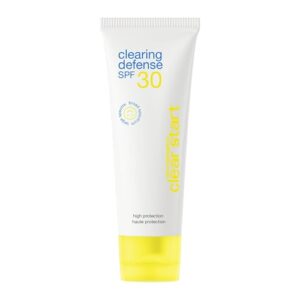 View On Amazon
View On Amazon Dermalogica Clear Start SPF 30 isn’t just a sunscreen—it’s a multitasking marvel for acne-prone skin.
With SPF 30, it shields against harmful UV rays while reducing shine thanks to natural tapioca.
Antioxidants like green tea and willow bark fight environmental stress, while TT technology balances your skin’s microbiome.
Its lightweight, non-greasy formula won’t clog pores, making it perfect for daily use.
Bonus? It doubles as a gentle base under makeup, providing all-day defense.
Just apply and reapply during sun exposure for all-day defense.
Best For: Teens and young adults with oily or acne-prone skin looking for a lightweight moisturizer with sun protection.
- Combines SPF 30 protection with acne-fighting ingredients.
- Lightweight, non-greasy formula suitable for daily use.
- Contains antioxidants that combat environmental stress and uneven skin tone.
- May not fully mattify very oily skin.
- Not fragrance-free, which might be unsuitable for sensitive skin.
- Can cause dry patches in some users due to mattifying effects.
9. Biossance Probiotic Gel Moisturizer for Redness
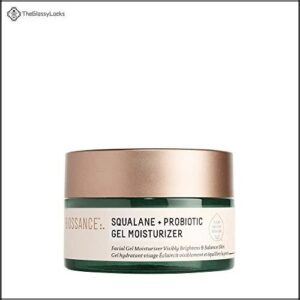
Biossance’s lightweight gel formula tackles multiple skin concerns with encapsulated probiotics that restore your skin’s natural balance.
You’ll notice visible redness reduction thanks to bisabolol from wild chamomile, while squalane delivers weightless hydration without clogging pores.
This moisturizer works particularly well if you’re dealing with reactive or blemish-prone skin that needs gentle care.
The non-greasy texture absorbs quickly, making it perfect for layering under makeup, and users consistently report calmer skin within weeks of regular use.
Best For: Adults with sensitive, reactive, or redness-prone skin who need a lightweight, hydrating, and balancing moisturizer.
- High cost compared to the small quantity.
- Some users with sensitive skin may experience stinging or redness.
- Packaging issues like lack of a seal and reports of dried-out product.
- Reduces redness and soothes irritation with natural bisabolol.
- Provides weightless hydration without clogging pores.
- Quick-absorbing and suitable for makeup layering.
10. Tata Harper Natural Hyaluronic Moisturizer
This gel moisturizer delivers hydration without the heaviness that can trigger breakouts.
You’ll appreciate its ultra-lightweight formula that contains hyaluronic acid, which draws moisture into your skin without clogging pores.
The 100% natural ingredients make it perfect if you’re concerned about synthetic additives.
Users with combination skin particularly love how it provides dewy hydration while keeping oily areas balanced.
At 50 milliliters, you’ll get consistent results when you massage 1-2 pumps onto clean skin morning and evening.
Best For: People with oily or combination skin seeking lightweight, non-toxic hydration without clogging pores.
- Comes with a strong floral fragrance that may not suit sensitive individuals.
- Considered expensive for the size and quantity.
- May cause allergic reactions in users with scent sensitivities.
- Hydrates skin without heaviness or oiliness.
- Made with 100% natural and clean ingredients.
- Improves skin texture and balances oil production.
How to Use Moisturizer With Acne Treatments
You might think moisturizer and acne treatments don’t mix, but combining them correctly can actually boost your skin’s healing process and prevent irritation.
The key lies in understanding the proper application order and choosing non-comedogenic formulas that won’t clog your pores while you fight breakouts.
Application Order for Best Results
The right skincare routine order can make or break your acne treatment success.
Follow this precise sequence for maximum effectiveness:
- Moisturizer First: Apply before harsh treatments like salicylic acid or benzoyl peroxide to create a protective barrier
- Treatment Timing: Wait 10-15 minutes between product applications for proper absorption
- Serum Integration: Layer lightweight serums before heavier moisturizers
- Nighttime Routine: Use tretinoin after moisturizing to reduce irritation
- SPF Before: Always finish morning routines with broad-spectrum sunscreen
Using a moisturizer before treatment can improve results.
Avoiding Pore-Clogging Ingredients
Despite promising labels, many acne moisturizers contain hidden ingredients that can sabotage your progress.
Always research product labels using the Comedogenic Scale—coconut oil and cocoa butter rank high as pore-clogging culprits.
Even "natural" doesn’t mean safe for acne-prone skin.
It’s essential to check for comedogenic ingredients in all skincare and hair products.
Consider alternative oils like jojoba or squalane instead.
Your ingredient research today prevents tomorrow’s breakouts.
Importance of Non-Comedogenic Formulation
When shopping for acne-prone skin care, look for "noncomedogenic" on product labels.
This term means the noncomedogenic moisturizer won’t block your pores or worsen breakouts.
Understanding ingredient awareness helps you make smarter product selection choices.
These formulations support long-term benefits by preventing pore clogging while maintaining skin health.
Always choose noncomedogenic options over regular moisturizers for acne prone skin.
Expert Advice for Acne-Prone Skin Care
Board-certified dermatologists consistently emphasize that acne-prone skin requires a personalized approach, as what works for your friend’s combination skin might trigger breakouts on your sensitive complexion.
Professional guidance helps you identify the right ingredients and application techniques, with most patients seeing noticeable improvements within 6-8 weeks of following expert-recommended routines.
This approach leads to better skin health, and understanding that personalized approach is key to managing acne effectively.
Dermatologist Consultation Benefits
When you’re feeling overwhelmed by endless product choices, a board-certified dermatologist becomes your skincare compass.
Expert skin analysis reveals your unique triggers, while treatment plan customization guarantees you’re not wasting money on wrong products.
Professional product recommendations cut through marketing noise, and managing side effects becomes manageable with prescription strength options when needed, providing a clear path forward with expert skin analysis.
Personalized Treatment Effectiveness
Working with a dermatologist reveals personalized acne treatment that addresses your unique skin needs.
Individual Skin Response varies dramatically—what clears your friend’s acne prone skin might worsen yours.
Board-certified professionals analyze these factors to recommend the perfect dermatologist recommended approach:
- Genetic Predisposition patterns in your family history
- Lifestyle Impacts from diet, stress, and sleep
- Environmental Factors affecting your daily routine
- Ingredient Synergies between salicylic acid and your current products
- Noncomedogenic moisturizer selection based on your skin’s oil production
Timeframe for Visible Improvement
Most acne treatments show initial results within 4-6 weeks with consistent use on acne prone skin.
Don’t expect overnight miracles – your skin barrier needs time to heal from inflammation and redness.
Stick with your routine for realistic expectations, as continued use brings long-term benefits.
If you’re not seeing improvement after three months, reassess your approach.
After this period, it may be time to explore prescription-grade solutions for long-term benefits and to address inflammation and redness.
Frequently Asked Questions (FAQs)
What is the best moisturiser for acne prone skin?
Think moisturizers will worsen your breakouts? You’re wrong.
Vanicream Daily Facial Moisturizer tops the list with its lightweight, non-comedogenic formula that hydrates without clogging pores.
Making it perfect for acne-prone skin.
What face cream is best for acne?
You’ll want Vanicream Daily Facial Moisturizer for its lightweight, non-comedogenic formula.
Alternatively, try Murad Clarifying Water Gel with salicylic acid or La Roche-Posay Effaclar Mat for oil control and breakout prevention.
Which moisturizer reduces acne?
Several moisturizers effectively reduce acne breakouts.
You’ll find salicylic acid-based options like Aveeno and Murad particularly helpful, while zinc-containing formulas like Dr. Barbara Sturm Cream target inflammation and excess oil production directly.
Should I moisturize my face if I have acne?
Contrary to popular belief, you absolutely should moisturize acne-prone skin.
Daily hydration prevents your skin from overproducing oil as compensation.
Choose noncomedogenic, lightweight formulas with ingredients like hyaluronic acid that won’t clog pores.
How often should I apply moisturizer for acne-prone skin?
Apply moisturizer twice daily for acne-prone skin – once in the morning and once at night after cleansing.
This consistent routine maintains your skin’s hydration barrier without clogging pores or worsening breakouts, which is crucial for acne-prone skin.
Can using moisturizer make existing acne worse?
Using the wrong moisturizer can clog pores, but noncomedogenic formulas actually help. They balance oil production and create a protective barrier, preventing your skin from overcompensating with excess sebum.
Should I use different moisturizers for day and night?
You don’t need separate day and night moisturizers for acne-prone skin. Choose one lightweight, noncomedogenic formula that works well under sunscreen during the day and provides adequate hydration at night.
Are tinted moisturizers safe for acne-prone skin?
Research shows 78% of tinted moisturizers contain comedogenic ingredients.
You can use them safely if they’re labeled non-comedogenic and oil-free.
Look for zinc oxide or titanium dioxide coverage with salicylic acid or niacinamide for acne benefits.
Can moisturizers help reduce acne scars?
Moisturizers can’t erase existing acne scars, but they’ll help prevent new ones by keeping skin hydrated and healthy.
Look for ingredients like niacinamide, hyaluronic acid, and ceramides to support your skin’s natural healing process.
Can oily skin skip moisturizer completely?
Ironically, skipping moisturizer makes oily skin produce even more oil to compensate for dryness.
You’ll create a vicious cycle of overproduction.
Instead, choose lightweight, noncomedogenic formulas that hydrate without clogging pores.
Conclusion
Finding the best face moisturizers for acne coincidentally requires the same patience your skin needs to heal.
These ten dermatologist-approved products prove you don’t have to sacrifice hydration for clear skin.
Start with non-comedogenic formulas containing salicylic acid or niacinamide, then adjust based on your skin’s response.
Remember, consistent use matters more than perfection.
Your acne-prone skin deserves proper moisture barrier protection while fighting breakouts effectively through targeted ingredients and gentle formulations.

